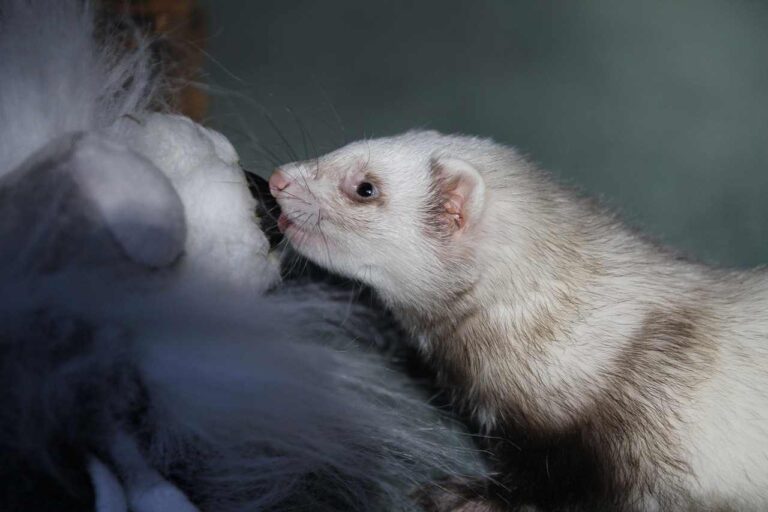Ferret Depression [Signs, Causes & Solutions]
![Ferret Depression [Signs, Causes & Solutions] Ferret Depression](https://petcreeks.com/wp-content/uploads/2023/12/ferret-2194028_1280.jpg)
Today, let’s dive into a topic that’s often overlooked but incredibly important: ferret depression.
We all want our furry friends to be happy and thriving, but sometimes they can experience a case of the blues.
In this post, we’ll explore the signs, causes, and simple ways to lift your ferret’s spirits. Let’s get those wagging tails back in action!
What is Ferret Depression?
Ferret depression refers to a condition where ferrets experience a prolonged state of low mood, lack of interest, and decreased activity levels.
This can be caused by various factors such as changes in their environment, illness, or lack of mental stimulation.
It requires careful observation and veterinary evaluation to determine the underlying cause and develop an appropriate treatment plan.
Can Ferrets Die From Depression
No, ferrets cannot die from depression, although ferrets can experience behavioral changes and show signs of distress when they are unhappy or stressed, there is no direct evidence to suggest that ferrets can die from depression alone.
However, prolonged psychological stress or neglect can have negative effects on their overall health and well-being.
Causes of Ferret Depression
![Ferret Depression [Signs, Causes & Solutions] Causes of Ferret Depression](https://petcreeks.com/wp-content/uploads/2023/12/ferret-918622_1280-1024x576.jpg)
Let’s talk about some of the most common causes of ferret depression which are as follows:
1. Loneliness: Ferrets are social animals that thrive on companionship. If a ferret doesn’t have enough social interaction or spends too much time alone, it can lead to depression. It’s important to provide them with regular playtime and interaction with both humans and other ferrets.
2. Lack of mental stimulation: Ferrets are intelligent creatures that need mental stimulation to stay happy and engaged. If they’re kept in a boring environment without enough toys, activities, or opportunities to explore, they can become depressed.
3. Inadequate diet: Poor nutrition can have a significant impact on a ferret’s well-being. Feeding them a balanced diet that meets their nutritional needs is crucial. A diet lacking in essential nutrients can contribute to lethargy and depression.
4. Health issues: Ferrets can suffer from various health problems, such as adrenal disease or insulinoma, which can lead to changes in behavior and mood. If you notice signs of depression in your ferret, it’s important to consult a veterinarian to rule out any underlying health conditions.
5. Changes in the environment: Ferrets are creatures of habit, and sudden changes in their environment can be stressful. Moving to a new home, rearranging furniture, or introducing new pets can all trigger depression in ferrets. It’s important to introduce changes gradually and provide a stable environment.
6. Lack of exercise: Ferrets have high energy levels and require regular exercise to stay happy and healthy. Without enough physical activity, they can become bored and depressed. Providing them with opportunities to play, explore, and engage in physical exercise is important.
7. Neglect or mistreatment: Ferrets that experience neglect or mistreatment can develop depression and anxiety. It’s essential to provide them with a safe, loving, and nurturing environment. Positive reinforcement, gentle handling, and regular care are important for a ferret’s well-being.
8. Grief and loss: Just like humans, ferrets can experience grief and depression when they lose a companion or a bonded owner. This can be particularly challenging for them since they form strong attachments. Extra attention, patience, and love can help them cope with the loss.
Signs of Ferret Depression
![Ferret Depression [Signs, Causes & Solutions] Signs of Ferret Depression](https://petcreeks.com/wp-content/uploads/2023/12/picture-386745_1280-1024x682.jpg)
Here are some of the most common signs of ferret depression you should know:
1. Loss of Appetite: Ferrets are typically enthusiastic eaters, so a sudden decrease in appetite can be a cause for concern. If your ferret starts refusing their usual food or treats, it could be a sign of depression. They may show disinterest in mealtime, take longer to finish their food, or even completely ignore it.
2. Lethargy: Depressed ferrets often display a lack of energy and motivation. They may seem tired or sluggish, spending more time sleeping or lying down rather than engaging in their usual activities. A normally active and playful ferret may become uninterested in exploring their environment or interacting with their human companions.
3. Hiding or Isolation: Ferrets are social animals that enjoy human interaction and the company of their fellow ferrets. If your ferret starts hiding more frequently or seeks out isolated areas of your home, it may be a sign of depression. They may retreat to dark corners, burrow under blankets or furniture, or spend long periods inside their hiding spots.
4. Excessive Sleeping: While ferrets are known for their ability to sleep for extended periods, an increase in sleep duration can be a sign of depression. If your ferret is spending even more time sleeping than usual and seems uninterested in waking up or engaging in activities, it may indicate emotional distress.
5. Unusual Aggression or Irritability: Depression can affect a ferret’s behavior, leading to uncharacteristic aggression or irritability. If your usually friendly and sociable ferret starts displaying signs of aggression, such as hissing, biting, or nipping, it may be a result of underlying emotional distress. They may also become easily irritated or show signs of being on edge.
6. Changes in Grooming Habits: Ferrets are naturally clean animals and typically spend a considerable amount of time grooming themselves. However, depressed ferrets may neglect their grooming routine. You may notice that their fur appears unkempt, matted, or greasy. They may stop grooming certain areas altogether, leading to a decline in coat cleanliness. Additionally, you might observe them scratching more frequently due to neglecting their grooming needs.
7. Weight Loss: Depression can lead to a decrease in appetite, resulting in weight loss. If your ferret is not eating enough or is losing weight without any obvious medical cause, it’s important to consider depression as a potential factor. Weight loss can be gradual or sudden, and it’s essential to monitor your ferret’s weight regularly to detect any significant changes.
8. Lack of Interest in Play: Ferrets are naturally playful creatures that enjoy interactive activities and toys. However, a depressed ferret may lose interest in playtime. They may ignore their favorite toys, avoid engaging in games, or show disinterest in interactive activities with their human companions. This lack of enthusiasm for play can be a sign that your ferret is not feeling their usual self.
Remember, while these signs are indicative of potential depression in ferrets, they can also be symptoms of other health issues.
Read more about ferret depression symptoms.
How to Cure Ferret Depression
![Ferret Depression [Signs, Causes & Solutions] How to Cure Ferret Depression](https://petcreeks.com/wp-content/uploads/2023/12/ferret-1191591_1280-1024x682.jpg)
Here are some of the most common ways of how to cure ferret depression:
1. Playtime Galore
Ferrets are natural-born players, and providing them with a variety of toys is essential to keeping them mentally and physically stimulated.
Tunnels offer opportunities for exploration and play, while balls and crinkly toys can satisfy their instinct to pounce and chase.
Feather teasers can engage their hunting instincts, providing an outlet for their natural behaviors.
Rotating their toys regularly can prevent boredom and keep their interest piqued.
Introducing new toys or rearranging their play area can also provide a fresh and exciting experience, encouraging them to stay active and engaged.
Therefore, playtime galore will go a long way in fixing your ferret depression.
2. Out and About:
Ferrets are naturally curious and love to explore new environments as this attribute can help in fixing your ferret depression.
Taking them out for a supervised adventure in a safe, ferret-proofed area provides valuable mental and physical stimulation.
Whether it’s a designated ferret playpen or a specially secured room, allowing them to investigate new surroundings can ignite their natural curiosity and provide a welcome change of scenery.
During these outings, be sure to monitor them closely to ensure their safety and prevent any potential mischief.
Providing a variety of safe objects for them to investigate, such as tunnels, hideaways, and climbing structures, can enhance their exploration and keep them entertained.
3. Bonding Time
Ferrets are social animals that thrive on interaction and companionship. Spending quality time with your ferret, whether it’s through snuggling, gentle petting, or just talking to them, can strengthen your bond and provide them with comfort and security.
Physical touch and verbal reassurance can go a long way in boosting their mood and helping them feel loved and valued.
Creating a routine of daily interaction, such as designated cuddle time or play sessions, can provide structure and predictability, which can be comforting to ferrets.
Additionally, incorporating positive reinforcement and rewards during these interactions can further strengthen the bond between you and your ferret and fix ferret depression.
4. Puzzle Time
Ferrets are highly intelligent and inquisitive animals, and mental stimulation is crucial to their well-being, this can be useful in fixing your ferret depression.
Introducing puzzle toys or games that challenge their minds can provide an outlet for their natural curiosity and problem-solving abilities.
Hide treats in puzzle toys or scatter them in hidden locations around their play area to encourage them to use their keen sense of smell and exploration skills.
Engaging in interactive play with your ferret, such as using a feather teaser or encouraging them to chase and capture moving objects, can also provide mental stimulation while promoting physical activity.
These activities not only keep them entertained but also provide an opportunity for bonding between you and your ferret.
5. Tasty Treats
Offering ferret-safe treats in moderation can be a delightful way to lift your ferret’s spirits. Whether it’s a small piece of cooked meat, a specialized ferret treat, or a small serving of fruits or vegetables, providing a variety of treats can add excitement to their day.
However, it’s important to be mindful of portion sizes and to avoid offering treats that may be harmful to their health.
Incorporating treat time into their daily routine can create positive associations with specific activities or interactions, such as training sessions or playtime.
This can further reinforce the bond between you and your ferret while providing them with a sense of enjoyment and satisfaction.
6. Enriched Environment
Creating a stimulating living space for your ferret is essential to their well-being.
Incorporating hiding spots, climbing areas, and cozy bedding can provide them with opportunities for exploration, play, and relaxation.
Ferrets are natural burrowers, so providing them with tunnels, hammocks, and soft bedding can satisfy their instinctual behaviors and create a comfortable, secure environment.
Introducing novel objects or rearranging their living space periodically can prevent boredom and encourage them to engage with their surroundings.
Providing a variety of textures, such as soft fabrics, natural materials, and safe chew toys, can also enrich their sensory experiences and keep them mentally and physically engaged.
7. Routine Maintenance
Establishing and maintaining a consistent daily routine is essential for the well-being of ferrets. This includes regular feeding times, play sessions, and designated rest periods.
Consistency and predictability can provide ferrets with a sense of security and stability, reducing stress and anxiety.
Creating a structured daily schedule that aligns with their natural behavioral patterns can help regulate their biological rhythms and promote overall well-being.
This can include designated times for feeding, play, social interaction, and rest, giving them a sense of routine and predictability.
8. Vet Check
If your ferret’s low spirits persist despite your efforts to provide a stimulating and enriching environment, it’s important to seek professional advice from a veterinarian.
Persistent changes in behavior, appetite, or activity level may indicate an underlying health issue that requires medical attention.
A veterinarian can conduct a thorough examination to assess your ferret’s physical and emotional well-being, as well as guide potential treatments.
Conclusion
In conclusion, remember that ferrets, just like us, can experience bouts of depression. It’s crucial to provide them with a stimulating environment, plenty of social interaction, and regular playtime to keep their spirits high. By understanding their needs and showering them with love, you’ll ensure your ferret leads a happy, fulfilling life.

![How Do Ferrets Show Affection [12 Easy Signs] How Do Ferrets Show Affection](https://petcreeks.com/wp-content/uploads/2023/10/pexels-evgeniya-litovchenko-9083453.jpg)


![Why Ferrets Bite [11 Reasons & Remedies] Why Ferrets Bite](https://petcreeks.com/wp-content/uploads/2023/10/ferret-1972523_640.jpg)

